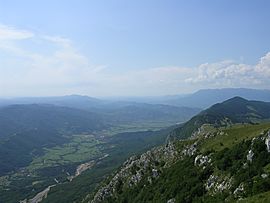Josip Murn facts for kids
Quick facts for kids
Josip Murn
|
|
|---|---|
 |
|
| Born | 4 March 1879 Ljubljana, Austria-Hungary |
| Died | 18 June 1901 (aged 22) Ljubljana, Austria-Hungary |
| Occupation | Poet |
| Literary movement | Fin de siecle, Symbolism |
Josip Murn, also known under the pseudonym Aleksandrov (4 March 1879 – 18 June 1901) was a Slovene symbolist poet. Together with Ivan Cankar, Oton Župančič, and Dragotin Kette, he was regarded as one of the beginners of modernism in Slovene literature. After France Prešeren and Edvard Kocbek, Murn was probably the most influential Slovene poet of the last two centuries.
Life
Murn was born in a condominium in the very center of Ljubljana as an illegitimate son to a poor woman, Maria Murn, and baptized Josef. His mother moved to Trieste soon after his birth, leaving him in foster care to some relatives from the suburbs of Ljubljana.
As a teenager, he enrolled in the local high school, where he came in contact with other young Slovene literates, such as Ivan Cankar, Dragotin Kette, and Oton Župančič, who experimented in new trends of European poetry, in particular Slovene Moderna, a national literary trend that combined Naturalism, Impressionism, Decadence and Symbolist ideas. He was a gifted student, shy, but also very self-confident. He started writing poetry at a very young age and soon achieved a very high level of quality. His talent was spotted by a high-class society woman Franja Tavčar, the influential wife of the national-liberal politician and author Ivan Tavčar, who arranged for him a scholarship to study at the University of Vienna.
In 1898 he moved to Vienna, spending there a year mostly visiting literary cafés and art exhibitions. Strongly influenced by the Viennese Secession, he wrote a series of poems with the common title Fin de siècle, in which he delivered his impressions on the life in the metropolis.
In 1899, he moved back home and started traveling around the Slovene Lands. He spent several months in Upper Carniola, when he observed the peasant life style. He began to incorporate peasant motifs in his symbolist poetry. He took elements not only from Slovene, but also from Irish, Scottish, Slovak, and Latvian folk motifs.
He later traveled to the Austrian Littoral, visiting his mother in Trieste and living briefly in Grado before settling in the Vipava Valley for some time. There, he decided to adopt the pseudonym Aleksandrov, reminiscent of Slavic peasant archaism, and moved to an even more simple and impressionist poetic expression.
He settled in Ljubljana in 1901, renting a small room in a slum building on the banks of the river Ljubljanica (an abandoned sugar factory, known as Cukrarna). He died there at the age of 22 from tuberculosis, on the same bed as his friend Dragotin Kette just two years before.
He is buried in the Žale cemetery, next to the tombs of Dragotin Kette, Ivan Cankar and Oton Župančič, in what is known as the "monument of Slovene modernism" (Spomenik slovenske moderne).
See also
 In Spanish: Josip Murn Aleksandrov para niños
In Spanish: Josip Murn Aleksandrov para niños


